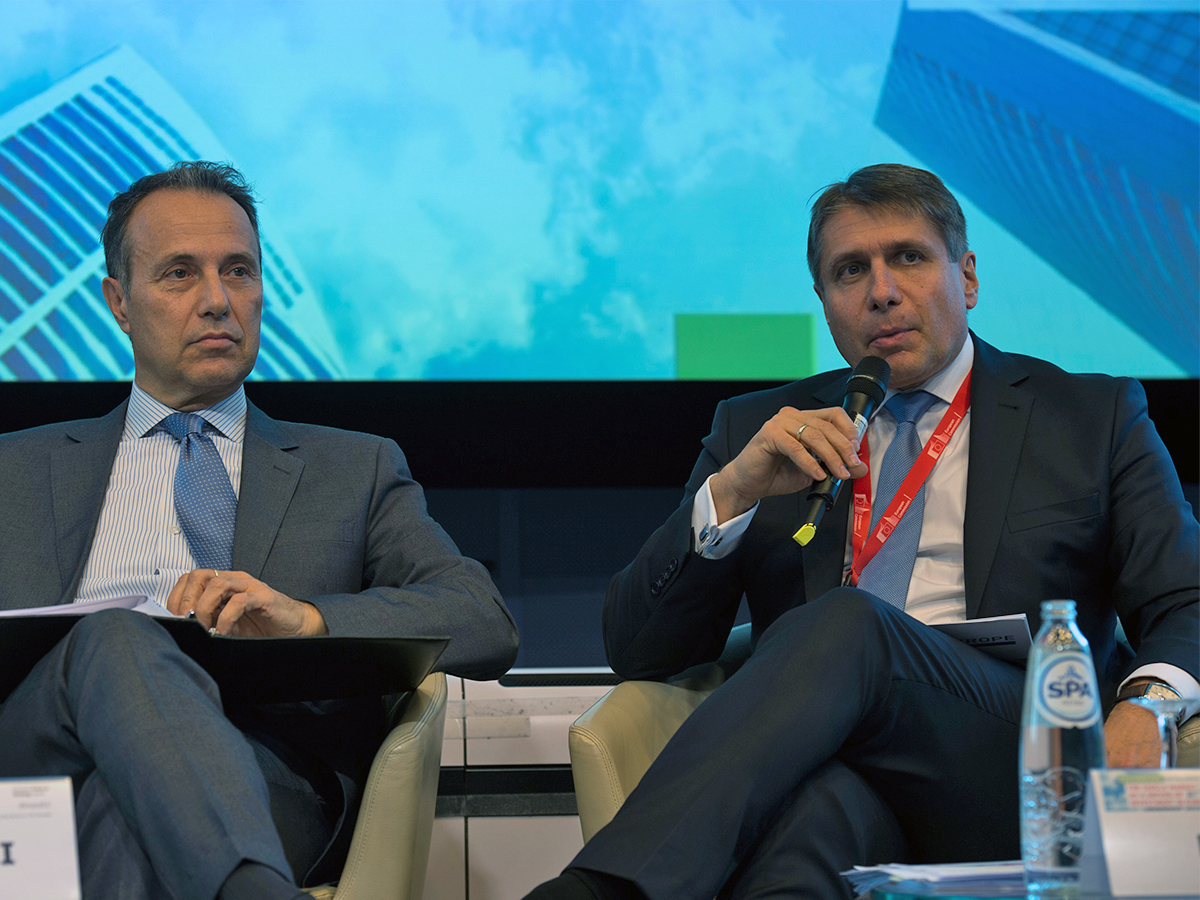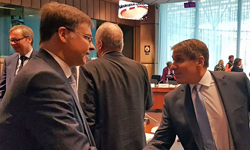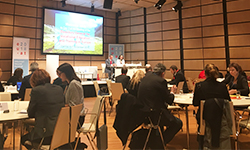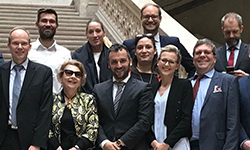BusinessEurope Headlines No. 2018-35
The EU Single Market as a driver of investment in Europe

Markus J. Beyrer, Director-General of BusinessEurope, discussed the state of play of the EU Single Market in a panel with business organisations at the high-level conference “The Single Market as a Driver of Investment in Europe”, organised by the European Political Strategy Centre of the European Commission on 5 November. Scheduled shortly before the launch of two new European Commission communications on the Single Market and on Investment due on 21 November, the conference gathered key stakeholders from the European institutions, Member States and private sector representatives. The conference focused on the follow-up steps needed to build on the success of the Single Market and the Investment Plan for Europe.
While acknowledging the fact that the Single Market is the major achievement of the EU and a real asset for broadly positive investment climate in Europe, participants highlighted the need to address the remaining regulatory barriers, administrative complexities and rise of protectionist rhetoric and decisions across the EU Member States. BusinessEurope’s approach to the Single Market was conveyed in five key messages. It was stressed that the Single Market should be brought back to the top of the political agenda, meaning that reconciliation of social or consumer or privacy protection interests with the freedoms of the Single Market should not result in less choice, higher costs and slower convergence for Europeans. The Single Market should not be artificially divided into “digital” and “offline”, and rather a holistic approach should be taken, as the digital dimension becomes a natural ingredient of goods and services in the modern economy. As Europe is still perceived as an expensive and complicated place to do business, simplification of rules and reduction of regulatory and administrative burden should be further pursued in the future Better Regulation agenda of the EU, and the Commission should act in cases of bad transposition or “over-implementation” by Member States. It was stressed that further opening and integration of the markets of goods and services, including logistics and network services, was necessary together with the infrastructure investment for Europe to be able to compete globally. Last but not least, the Single Market needs strengthened enforcement of rules and an effective system for remedies in order to ensure the level-playing field. “Europe needs a fair level-playing field with the unquestioned four freedoms of movement of people, capital, goods, services and an additional boost for data economy”, Beyrer said.
Contact: Martynas Barysas
Photo copyright: European Union, 2018
Video message on apprenticeships across the EU
Differences in the models of apprenticeship programmes across the EU impact on their attractiveness for companies and young people. Watch this video to know the main differences in the models and how to maximise the benefits that apprenticeships can bring.
Our comment
Don’t let insufficient skills hamper job creation due to digitalisation
By Frederik Lange, Advisor for Economic Affairs

New technologies such as digitalisation and artificial intelligence (AI) are fundamentally changing our economies and the way we work, with the potential to hugely increase our prosperity. However, recent breakthroughs have also triggered concerns about job losses.
Our recent Economic Outlook looks in depth into the potential impact of digitalisation on the EU economy and labour market – a topic which was recently discussed by EU finance ministers and at the Macroeconomic Dialogue meeting between the European Commission, Council, European Central Bank and EU Social Partners.
Studies, such as for example by the Organisation for Economic Co-operation and Development (OECD)[1], conclude that around 9% of jobs across OECD countries could be replaced by new automation technologies, with another 25% of jobs where tasks could change significantly because of automation.
However, this is only one side of the coin as technological progress can also increase demand for labour. For example, a recent survey of the World Economic Forum (WEF)[2] finds that while globally 75 million jobs may be displaced by new technologies by 2022, 133 million additional new roles are also expected to emerge. Whilst routine-based, middle-skilled roles, such as data entry clerks, are expected to become redundant, jobs are likely to emerge in fields based on enhanced use of technology. These include for example big data analysts and machine learning/AI specialists, social media specialists, and roles that leverage ‘human’ skills, like sales and marketing professionals or customer service workers.
So, whilst digitalisation can help increase demand for labour, the potential of job losses in specific sectors and occupations means there is an important role for governments in helping facilitate workers in moving to new jobs.
And we need to raise our game in this regard. A recent survey from Cedefop[3] finds that already today 10% of EU adult workers are at high risk of having outdated technological skills, with 21% of employees considering it very likely that their skills will be obsolete in the next 5 years. Jobs in the future will increasingly combine digital with technical, soft and behavioural skills. Those jobs expected to grow the strongest in the future are particularly likely to require high cognitive skills like literacy, numeracy, foreign languages, problem-solving or learning to learn and non-cognitive skills like communication, planning, and customer service.
The key is therefore to ensure that adequate frameworks for re-skilling are in place, as well as modern systems of lifelong learning. Urgent policy action is required to ensure that workers are equipped with the adequate skills to navigate successfully through a rapidly changing, technology-rich work environment.
[1] Arntz, M., T. Gregory and U. Zierahn (2016), “The Risk of Automation for Jobs in OECD Countries: A Comparative Analysis”, OECD Social, Employment and Migration Working Papers, No. 189, OECD Publishing, Paris.
[2] World Economic Forum (2018), “The Future Jobs Report”, Centre for the New Economy and Society.
[3] Cedefop, (2017), “People, machines, robots and skills”. Briefing note.
Contact: Frederik Lange
Video message on the Autumn Economic Outlook
BusinessEurope Director General Markus J. Beyrer presents the main points of Economic Outlook Autumn 2018. He highlights that despite the recent slowdown, businesses still expect EU growth to proceed above its long-term rate. However, businesses see the danger of escalating trade conflicts as a key risk, with the IMF estimating that such an escalation would reduce global GDP by almost one percent in 2020.
Escalating global trade tensions and skills shortages: a risk for EU economy
 “We need wide-ranging reforms in product and labour markets in order to raise the EU’s underlying capacity to grow”, BusinessEurope Director General Markus J. Beyrer said at the Macroeconomic Dialogue (MED) meeting at political level on 5 November 2018. The MED provides a forum for exchanging views between the European Commission, Council, European Central Bank and social partners. At the meeting, Beyrer also referred to BusinessEurope Autumn Economic Outlook released at the same day. He noted that “while the EU economy has slightly slowed down in the first half of 2018, we expect growth to remain above its long-term rate. Our analysis shows that we can expect EU growth of 2.2% for 2018 and 2% for 2019, a slight downward revision from our spring 2018 analysis. However, an escalating global trade war and digital skills shortages in Europe are the major concerns for many businesses in Europe. We need more skilled labour to avoid harm to the EU economy. We also see that with digitalisation more jobs will be added than lost.”
“We need wide-ranging reforms in product and labour markets in order to raise the EU’s underlying capacity to grow”, BusinessEurope Director General Markus J. Beyrer said at the Macroeconomic Dialogue (MED) meeting at political level on 5 November 2018. The MED provides a forum for exchanging views between the European Commission, Council, European Central Bank and social partners. At the meeting, Beyrer also referred to BusinessEurope Autumn Economic Outlook released at the same day. He noted that “while the EU economy has slightly slowed down in the first half of 2018, we expect growth to remain above its long-term rate. Our analysis shows that we can expect EU growth of 2.2% for 2018 and 2% for 2019, a slight downward revision from our spring 2018 analysis. However, an escalating global trade war and digital skills shortages in Europe are the major concerns for many businesses in Europe. We need more skilled labour to avoid harm to the EU economy. We also see that with digitalisation more jobs will be added than lost.”
Contact: Frederik Lange
European Vocational Skills Week useful to promote vocational training across Europe
 The third European Vocational Skills Week is taking place in Vienna and involves a range of discussions about the future of vocational education and training (VET), as well as how to further strengthen apprenticeship systems and provision, in particular. For employers, it is clear that the labour market relevance of VET needs to be enhanced in order to help companies address their skills needs as well as to help people enter and develop in the work place. Initiatives such as the vocational skills week have an important role in promoting the benefits of VET to a wider audience.
The third European Vocational Skills Week is taking place in Vienna and involves a range of discussions about the future of vocational education and training (VET), as well as how to further strengthen apprenticeship systems and provision, in particular. For employers, it is clear that the labour market relevance of VET needs to be enhanced in order to help companies address their skills needs as well as to help people enter and develop in the work place. Initiatives such as the vocational skills week have an important role in promoting the benefits of VET to a wider audience.
Contact: Robert Plummer
Legal Affairs Committee meets Ministry of Justice and visits Supreme Court in Austria
 BusinessEurope and the members of its Legal Affairs Committee gathered in Vienna for a meeting hosted by the Federation of Austrian Industries (IV) on 24 and 25 October 2018. The Committee had an exchange of views on company law, insolvency law and consumer law with Mag. Christian Pilnacek, Secretary General of the Federal Ministry of Constitution, Reform, Deregulation, and Justice (BMVRDJ). The Committee also visited the Austrian Supreme Court (OGH) where it met with their President Hon.-Prof. Dr. Elisabeth Lovrek and two vice-presidents with whom there was an exchange on the functioning of courts in the digital age as well as on the challenges of implementing of EU law.
BusinessEurope and the members of its Legal Affairs Committee gathered in Vienna for a meeting hosted by the Federation of Austrian Industries (IV) on 24 and 25 October 2018. The Committee had an exchange of views on company law, insolvency law and consumer law with Mag. Christian Pilnacek, Secretary General of the Federal Ministry of Constitution, Reform, Deregulation, and Justice (BMVRDJ). The Committee also visited the Austrian Supreme Court (OGH) where it met with their President Hon.-Prof. Dr. Elisabeth Lovrek and two vice-presidents with whom there was an exchange on the functioning of courts in the digital age as well as on the challenges of implementing of EU law.
Contact: Pedro Oliveira
Calendar
- 19 November: Extraordinary Eurogroup meeting on EMU reform
- 19 November: Company Law Package, JURI vote
- 21 November: Horizon 2020, ITRE vote
- 27 November: European Trade Policy Day 2018
- 3-14 December: Katowice Climate Change Conference
Reminder: please take a look at our revised privacy policy